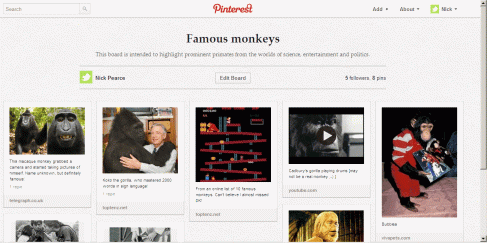Well I’ve finally gotten round to having a look at Pinterest, which at first glance looks to be relevant to a number of projects that I’ve been working on over the last few years, and looks a promising basis for some future projects which will continue some of the themes I’ve been developing such as ‘clickolage’ and openish practice.
Pinterest is, in its own words, “a virtual pinboard. Pinterest allows you to organize and share all the beautiful things you find on the web. You can browse pinboards created by other people to discover new things and get inspiration from people who share your interests”.
In a previous project I looked at teaching with YouTube playlists which was an interesting angle, but had plenty of pitfalls, including being tied to one platform. A very interesting and striking feature of Pinterest is that it piggybacks on all (or nearly all, I think some sites limit acccess) the web. You don’t even have to sign up with an account, once you have asked to be invited you can join in via your twitter or facebook account. In this sense Pinterest is very squarely a meta – site and has proven to be pretty popular so far, despite some copyright concerns (more of which in a bit).
So Pinterest could be a good medium for sharing images, and videos, all of which incorporate links to their original sources and facilitate commenting and sharing. This would seem to tie in quite nicely with the concept of clickolage I’ve developed for a forthcoming article in Teaching Anthropology which emphasised these aspects of learning where clickolage is “the self-directed creation, curation and linking of multimedia content through social media sites and tools”.
In order to have a play around I have created a pinboard called ‘famous monkeys’, here’s a screenshot because at the moment I don’t think it’s possible to embed pinboards (which could be really useful) only individual pins.
Naturally I’m not the first to consider using Pinterest for education. A group of sociology grad students in america (i think), the Sociology Cinema, have been very quick to explore some of the possibilities and have already put together a useful resource. Chareen Snelson, who has done some really interesting work with YouTube, has also been quick to consider some of the educational possibilities of this new site .
There are some important critical considerations to think about though. Obviously Pinterest is yet another internet startup with no clear business model which could die a death or change business models, so I am wary of investing too much time into this. On the other hand it is an incredibly lightweight means for collating content, so doesn’t really take too much time.
The more important cloud on the horizon is the site’s cavalier treatment of copyright. Some of the legal issues have been discussed elsewhere but they boil down to who owns the material being ‘pinned’ and more problematically whether or not they have permission to use those images in that way (which seems v. unlikely). As Pinterest continues to grow (currently 12 million users) and maybe starts to look valuable I am sure that these issues will become more prominent.
This somewhat cavalier attitute to copyright reflects my views on opennish educational practice, where practice preceeds policy and open activities such as sharing, curating and commenting on things can happen even though they are certainly breaking the letter of the copyright law. In my case I’m talking about for the purposes of education not profit, so Pinterest is an interesting case as they are not pretending to be anything other than private profit making (at some point) company.
Definitely a site to keep an eye on, and I’m working on an internal proposal for a little bit of money to pay a student to use the site to collate relevant materials, seed and moderate pinboards for one of the classes I teach. Fingers crossed, and see if you can help me by sharing some famous monkeys…

